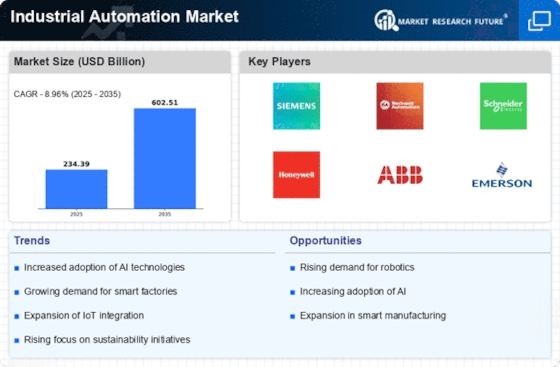Market Share
Industrial Automation Market Share Analysis
In recent years, India has made remarkable progress in the realm of industrial automation, largely driven by strategic initiatives like Make in India and Digital India. The Indian government's proactive approach, characterized by global outreach and appealing plans, has successfully attracted numerous global corporations. Instead of importing goods and services, these corporations have chosen to establish manufacturing facilities within the country. This shift in strategy has resulted in the development of advanced automated production facilities, contributing significantly to technological advancement and economic growth. Furthermore, this surge in industrial automation has led to the creation of more job opportunities, marking a positive impact on employment rates.
Across the globe, the United Kingdom has displayed a heightened interest in comprehending the implications of automation on the future of work. The Business, Energy, and Industrial Strategy Committee (BEIS) has played a pivotal role in this effort, releasing a comprehensive report on the subject. This report delves into the multifaceted aspects of automation and its potential effects on the workforce. The BEIS committee has formulated specific recommendations, particularly focusing on the adoption of automation technology to navigate the evolving landscape of work. The UK government has embraced these recommendations, aligning itself with the committee's vision.
The UK government recognizes the paramount importance of increasing the adoption of technologies that support automation, alongside fostering the integration of other smart and digital technologies. This recognition stems from the understanding that such initiatives are crucial not only for securing future economic growth but also for ensuring overall prosperity and enhanced productivity. The commitment to becoming a global leader in Smart Robotics stands out as a testament to the UK government's forward-thinking approach. By endorsing widespread adoption of these cutting-edge technologies, the government envisions substantial benefits, particularly in terms of bolstering competitiveness and elevating productivity across diverse sectors of the economy.
The initiatives in both India and the United Kingdom underscore a global paradigm shift toward embracing automation and emerging technologies. These efforts are not only shaping the economic landscapes of these nations but also influencing the trajectory of technological innovation on a global scale. The collaborative synergy between governments, industries, and technological advancements is paving the way for a future where automation is not just a transformative force but a cornerstone of sustainable economic development. As both nations continue to invest in and prioritize automation, the ripple effects are anticipated to extend beyond their borders, influencing the broader international community and contributing to a new era of work and industry.

















Leave a Comment